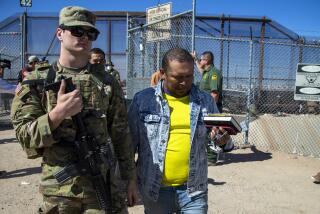U.S.-Led Task Force Leaving Kurdish Area
ISTANBUL, Turkey — The U.S.-led task force to save Kurdish refugees on the Turkey-Iraq border ended the first part of its mission Tuesday, and allied spokesmen said that in just eight weeks most of the nearly half-million refugees have been persuaded to head back to their homes in Iraq.
Task Force Alfa, the allied military group set up to help relieve the suffering in Turkish border camps as Kurds fled Iraq after their abortive rebellion in March, has been disbanded, said U.S. Navy Cmdr. John Woodhouse, an allied spokesman in Turkey. He added that the 60 U.S. Special Forces soldiers who led the task force “are going home.”
Only 800 refugees remain in one mountain border camp at Cukurca, to the east, Woodhouse said, and Special Forces troops there have handed over responsibility for them to the United Nations.
A second allied contingent, Task Force Bravo, has the job of coaxing the few remaining refugees back down from the mountains and rehabilitating northern Iraqi towns, roads and hospitals damaged in the Kurds’ revolt against Iraqi President Saddam Hussein.
According to U.S. and Turkish officials, 42,000 tons of food, medicine, clothing and other aid were delivered to the refugees in the eight-week period.
The biggest single contribution, 20,000 tons, was from Turkey, especially Turkish Kurds, who in the desperate first week carried food up to the nearly inaccessible, 6,000-foot-high camps.
The Turkish Red Crescent Society delivered 5,000 tons of international aid, and allied military airplanes, helicopters and trucks took in 17,000 tons.
As they leave, the refugees “are taking everything with them, from tree-branch tent poles to plastic sheeting,” a Turkish official said.
“The Turkish border population is gone. It has been quite a fantastic accomplishment as far as all are concerned,” said Daniel Conway, Ankara coordinator of civilian relief efforts and representative of the Office of the U.N. High Commissioner for Refugees.
More to Read
Sign up for Essential California
The most important California stories and recommendations in your inbox every morning.
You may occasionally receive promotional content from the Los Angeles Times.









